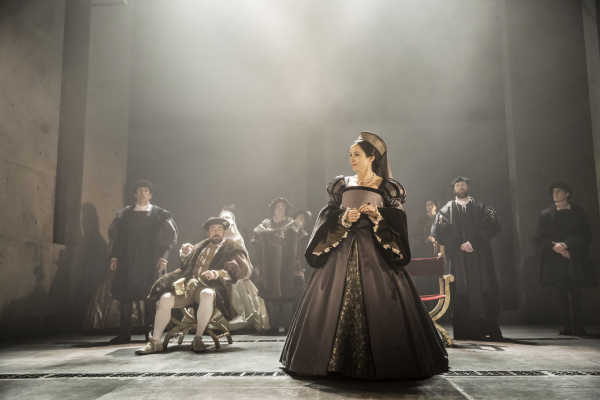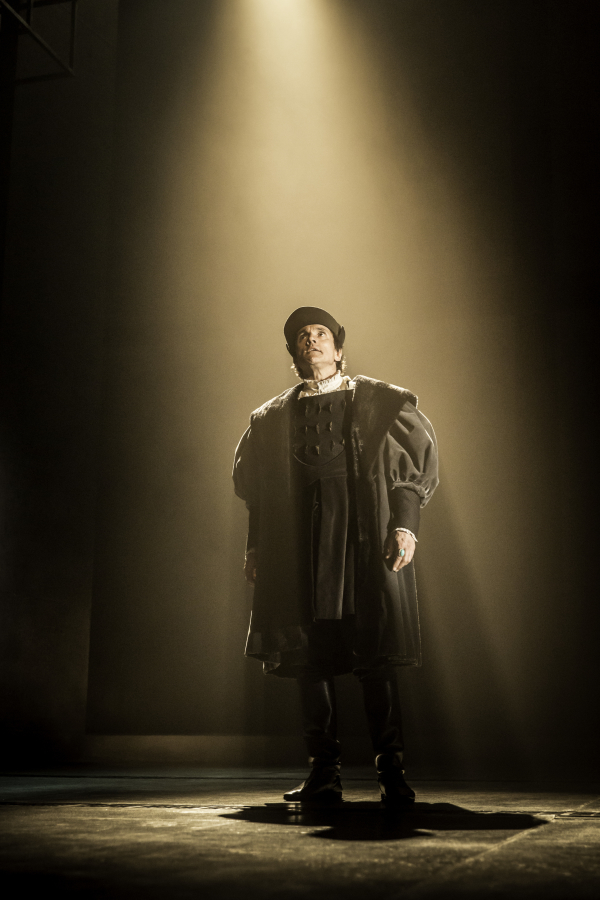Wolf Hall: Parts One & Two
Junk history makes for exciting theater in the stage adaptations of Hilary Mantel’s popular novels.

(© Johan Persson)
When viewing a Shakespeare history play (like Richard III), you get the sinking suspicion that you're watching artfully constructed 400-year-old propaganda. The characters are just so over-the-top, their motives suspect, the plot loose in its adherence to historical fact. None of this makes the play any less thrilling. Such is the case with novelist Hilary Mantel's Wolf Hall, now making its U.S. stage premiere at Broadway's Winter Garden in a sweeping two-part theatrical event. Mantel's account of Tudor England is rife with historical revisionism, and like Shakespeare's histories, it is infinitely watchable. Just be aware that you're consuming beautiful lies rather than verifiable truth.
Wolf Hall began as a series of critically acclaimed novels before playwright Mike Poulton adapted them to the stage for the Royal Shakespeare Company. Mantel's edits for this Broadway run were apparently significant enough to warrant a stealthy note in the back of the program alerting us to the alterations from the West End mounting. Whatever changes have been made, we can be certain this is very much Mantel's story.
It takes place during a well-trodden period in British history: the reign of King Henry VIII (Nathaniel Parker). After a 24-year marriage to Katherine of Aragon (Lucy Briers), the king still does not have a male heir. Without one, he fears that upon his death England will plunge into civil war. But Catholics can't divorce, so what's a sovereign to do? Henry's faithful Lord Chancellor Cardinal Wolsey (the funny and relatable Paul Jesson) tries for an annulment, but Katherine won’t play along, threatening to go straight to the Pope. Henry leaves her for Anne Boleyn (Lydia Leonard) anyway, essentially creating the Church of England so he can have a second wife.

(© Johan Persson)
While Part One charts Boleyn's ascendancy as Queen, Part Two (subtitled Bring Up the Bodies) depicts her bloody fall. Leonard plays her as an erratic Cersei Lannister type, power mad and suffering from delusions of grandeur. Her outsize queenliness sometimes gets the best of her, as when she becomes frustrated with Wolsey's lack of progress in the annulment and encourages Henry to remove him as Lord Chancellor, leading to the elevation of Sir Thomas More (John Ramm). Unfortunately, More is an even more committed Catholic than Wolsey and refuses to recognize the King's new marriage as legitimate.
Mantel's sympathy lies squarely with More's archrival Thomas Cromwell (the amiable Ben Miles), which seems like a refreshing shift considering More's literal sainthood and the negative light in which Cromwell is presented in Robert Bolt's popular drama A Man for All Seasons. In Mantel's world, More is portrayed as an idiotic Catholic fanatic, flagellating himself and shouting accusations of heresy. It's difficult to believe that the slack-jawed-numbskull-with-a-bowl-cut Ramm so dutifully portrays is the same guy who wrote Utopia. Mantel's version of events may be unique, but there's a reason for that: They have very little foundation in fact.
Still, there's much for a modern audience to like about Mantel's fictionalized version of Cromwell. He's a man of humble origins who, through his own ingenuity and hard work, pulled himself up to be at the right hand of the king. Miles plays him as a poker-faced master negotiator, navigating a world of low morals and high birth with his own keen sense of politics. The story is rife with palace intrigue. It's like the television show The Tudors, but with less explicit sex and violence.
Indeed, all the most exciting stuff happens offstage in Jeremy Herrin's efficient Shakespearean staging. You know someone has died when a coffin borne by black-clad monks passes upstage while a light snow falls. A parade of nobles and historical figures march through bearing news and rumors from beyond. Christopher Oram's versatile set provides for these quick entrances and exits while imposing an aura of metal and flame. A rusty steel frame hangs overhead like a cage, ready to trap any of the rats scurrying below. The upstage wall forms a giant Cross of St. George, which Paule Constable and David Plater light in a stunning variety of formations to create distinct places for this play that jumps o'er times with what seems like a cast of thousands.
Oram has outfitted them all in detailed costumes that are both beautiful and revealing of character. Queen Katherine and Princess Mary (Leah Brotherhead) look like dour nuns in mourning, in case there was any question about their unflappable Catholicism. Lothario George Boleyn (Edward Harrison) sports a massive gilt codpiece that makes him look like a Renaissance-era Spider-man. Cromwell, on the other hand, is the picture of a rational statesman in his understated black fur-trimmed robe.
Mantel isn't exactly coy about her politics: Her most recent collection of short stories is titled The Assassination of Margaret Thatcher. So it should surprise no one that Cromwell is portrayed as a champion of (and from) the common man, gently guiding (and sometimes executing) the irascible nobility for the benefit of the people. "No ruler in the history of the world has ever been able to afford a war," he advises the king. "War uses up all the money you've got — then it breaks you and bankrupts you." Amazingly, Mantel gets us to think about Iraq and Afghanistan in the middle of this play about 16th-century England.
But in that respect, Mantel is no so different from Shakespeare: using a dubious version of history to grind a contemporary political ax. It will be interesting to see how, in her third and final installment (presently titled The Mirror and the Light), Mantel reconciles her pragmatic political operator with the reality of a protestant zealot who epically bungled the king's fourth marriage, leading to his own spectacular fall from grace. Mantel expects the book to be completed in 2016, with a stage version sure to follow.









